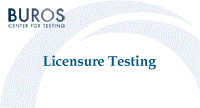
Buros-Nebraska Series on Measurement and Testing
Licensure Testing: Purposes, Procedures, and Practices
Copyright © 1995, Buros Institute of Mental Measurements. Digital Edition copyright © 2012, Buros Center for Testing.
This book may be downloaded, saved, and printed by an individual for their own use. No part of this book may be re-published, re-posted, or redistributed without written permission of the holder of copyright.
There are few books devoted solely to the topic of licensure testing, but each state and the federal government is involved in this form of testing. Licensure testing is far too important to be undertaken casually, because it is big business and it has implications and consequences for thousands of people annually. Every author in this book is involved in some way with licensure testing. Some authors work for professional organizations that are responsible for development of licensure tests. Other authors work for companies that contract with licensure boards to develop licensure tests. The rest serve as consultants to one or more licensure boards to assist in the development and maintenance of licensure testing programs. The intent of this book is to provide licensure board members with practical information that will help them to understand and carry out their measurement related responsibilities. Many licensure boards employ consultants to assist in developing or selecting measures to use in making the licensure decision. They employ such consultants for a number of reasons (for example, because they do not have large numbers of employees who are trained in test development, because the occupations they are charged with regulating may have only small numbers of applicants, or because they have little funding and must issue licenses based on results of tests developed by national professional organizations). The reason for employing outside consultants is not really material, the board is the legally responsible agent and the board must make decisions about the test. This book is intended to help board members make such decisions. This book is also intended to aid measurement consultants by providing them with specific information written in the context of licensure testing. This book provides some technical guidance useful in the development of licensure tests. Most chapters contain some technical content (especially the chapters in Part Two); however, there was an attempt to make most of the content readable by board members while providing measurement consultants with guidelines and references that will assist them in their consulting role.
1995
Title and Contents- Licensure Testing: Purposes, Procedures, And Practices, James C. Impara and Linda L. Murphy
Dedication- Licensure Testing: Purposes, Procedures, And Practices, James C. Impara
Preface- Licensure Testing: Purposes, Procedures, And Practices, James C. Impara
Section One: Purposes and Policy Issues
1. What is Licensure, Kara Schmitt
2. Legal And Professional Bases For Licensure Testing, William A. Mehrens
3. Policy Issues With Psychometric Implications, Michael Rosenfeld, Richard F. J. Tannenbaum, and Scott Wesley
Section Two: Overview of the Procedures for Developing a Licensure Examination, James C. Impara
4. Practice Analysis: Building The Foundation For Validity, Joan E. Knapp and Lenora G. Knapp
5. Systematic Item Writing And Test Construction, Anthony LaDuca, Steven M. Downing, and Thomas R. Henzel
6. Developing And Using Clinical Examinations, Jimmie C. Fortune and Theodore R. Cromack
7. Basic Psychometric Issues In Licensure Testing, Howard W. Stoker and James C. Impara
8. Item Banking, Betty A. Bergstrom and Richard C. Gershon
9. Differential Item Functioning In Licensure Tests, Barbara S. Plake
10. Establishing Passing Standards, Craig N. Mills
11. Equating, Judy A. Shea and John J. Norcini
Section Three Emerging Practices
12. Computerized Testing In Licensure, C. David Vale
13. Future Psychometric Practices In Licensure Testing, Steven S. Nettles
Licensure Testing: Purposes, Procedures, and Practices [Complete Work], James C. Impara and Linda L. Murphy

